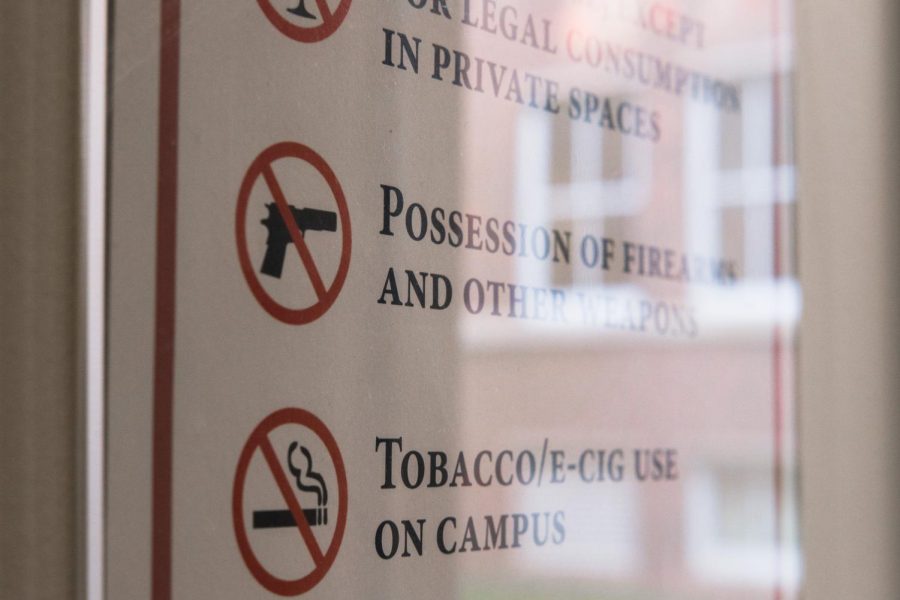Macalester wrestles with prospect of ‘violent incident’
September 19, 2019
From high school students to presidential debate stages, conversations around how to address America’s gun violence epidemic and have risen in prominence and urgency in recent years. The specific problem of mass shootings in schools has forced Macalester’s students and administration to grapple with this question as well.
On Sept. 9, Macalester security emailed an online “violent incident training” module to students, faculty and staff to be completed by Oct. 1. It is the first time the college has mandated such a training.
The training, which takes between 15 and 25 minutes to complete, asks people to watch a sequence of videos detailing how to practice situational awareness and explaining ‘run, hide, fight’ — the college’s policy regarding violent incidents.
To complete the training, students, faculty and staff must get at least 10 of 12 questions right on a quiz.
While the email announces the link as a ‘violent incident’ training, the module itself is titled “Active Shooter: Run, Hide Fight for Students” and focuses on responding to active shooter situations. It lists warning signs indicating that someone may commit a mass shooting and primes people on how to respond if they encounter such a situation.
Associate Vice President of Facilities Nathan Lief and Associate Director of Security Bill Collumbien, along with the rest of the college’s incident management team, decided over the summer to implement the training.
According to Lief, the decision to call it “violent incident training” rather than “active shooter training” is an acknowledgment that violence in the United States extends beyond guns.
Before settling on the training module, Lief and Collumbien reviewed several other options. They ultimately chose the SafeColleges module because it matched Macalester’s run, hide, fight terminology, and decided to require students, faculty and staff to take it online, which allows them to ensure all students complete it.
While security and facilities are trying to educate the campus community about how to respond to a violent incident on campus, Joe McMurtrey ’22, Charlotte Melrose ’22 and Pierce Hastings ’22 are trying to keep those incidents from happening in the first place.
All three are founding members of the Macalester chapter of Students Demand Action (SDA), a gun-violence prevention group allied with Moms Demand Action that became active on campus last spring.
Macalester’s Incident Management Team (IMT), which includes people from across different campus offices, decided to implement this training module without consulting the Macalester SDA or soliciting any other student input.
But SDA leaders were unbothered by IMT’s edict, acknowledging that, given the scourge of gun violence in the United States, addressing preventative safety is necessary.
“I’m not angry at facilities for creating a program because frankly, [gun violence] is something that, unfortunately, we have to address,” McMurtrey said. “It’s the new tornado warning.”
All three have engaged in state and nationwide lobbying efforts as well as organizing storytelling nights on campus. Melrose and Hastings were both drawn to activism through personal experience with gun violence.
“A family friend of mine, his daughter was shot and killed in a drive-by shooting in Oakland, California,” Melrose said. “It definitely had a tough effect on our community because we just didn’t expect something like that to happen.”
Hastings, too, lost an aunt in an anti-Semitic mass shooting at a Jewish nursing home.
“[He] was a neo-Nazi, white nationalist, Grand Dragon of the KKK, he was an ex-felon as well,” Hastings said of the shooter. “He made several threats on the life of the leader of the Southern Poverty Law Center, so he was on the no fly list — on all these lists that should have disqualified him from purchasing a weapon.”
In addition to spurring their political action, that personal experience also affects how these students approach the violent incident training.
Hastings noted that active-shooter trainings are often written for people who don’t “really care about gun violence… or [who don’t] think that a shooting is ever going to happen to them,” which overlooks the possibility of triggering survivors — a growing group of people in the U.S.
The IMT acknowledged the concern around triggering survivors, and Lief said it was a part of their decision-making process. In the past, Macalester used a video provided by the Department of Homeland Security that made some people affected by gun violence uncomfortable, according to Lief. With the new module, the team tried to find a balance that would get people the information they need without triggering them.
“This is a serious subject matter, and we certainly didn’t take this lightly either as we developed the program,” Lief said.
Collumbien informed first-year students of the module during an orientation session, and the rest of the campus community found out via the Sept. 9 email. The email told students that they “will receive follow-up reminders” until they complete the training if they have not by Oct. 1. Outside of further reminders, there are no consequences for students who do not complete the training.
Even with the lack of repercussions, Lief noted the importance of asking all students to take the training — with a specific focus on international students who may not have grown up with the same lockdown and active-shooter trainings as domestic students.
While international students may not have been raised in countries with frequent mass shootings and lockdown drills, Roan O’Neill ’20, from Belfast, Northern Ireland, said that international students are aware of the problem, and he expressed a certain amount of frustration with the online nature of the module.
“We know when we’re coming to the U.S. there’s people [who] can buy guns and… they’re not regulated or they’re hardly regulated,” he said. “People know the consequences of that.”
In the three weeks since students returned to campus, those consequences have come increasingly close to Macalester.
On Labor Day, three people were shot outside of State Fair Park in Saint Paul. A week and a half later, a gunman robbed the Caribou Coffee on Snelling Ave., where multiple Macalester students work — though none were on duty at the time. That same day, a pizza delivery driver for the Toppers on Grand Ave. was robbed at gunpoint. Three days later, a man died in an officer-involved shooting in Midway-Hamline.
The resonance of the four violent incidents close to campus underscored a point made by Hastings.
“I think the training module as a whole should be seen more as a symptom of the societal epidemic of gun violence than it should be seen as a solution by any means,” he said.














